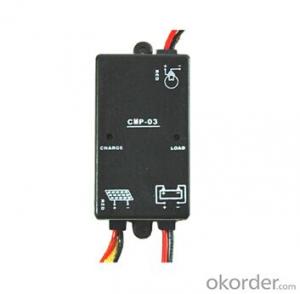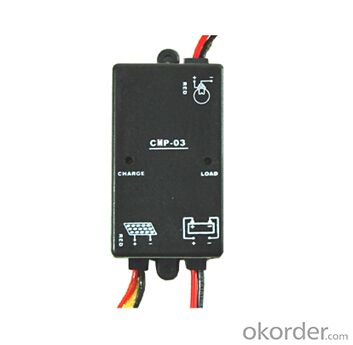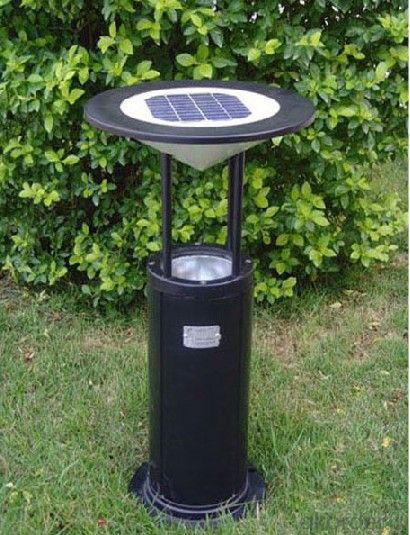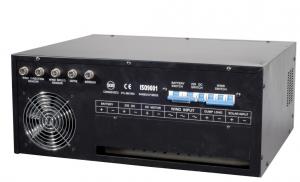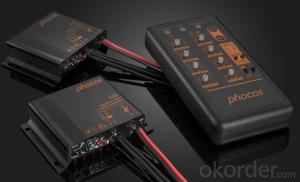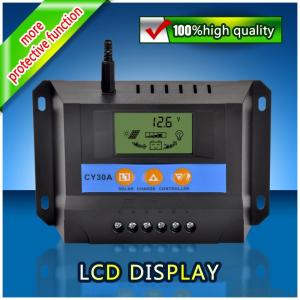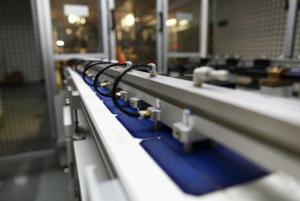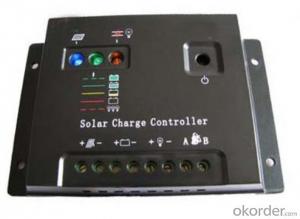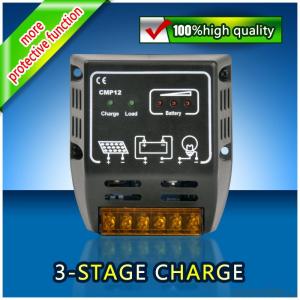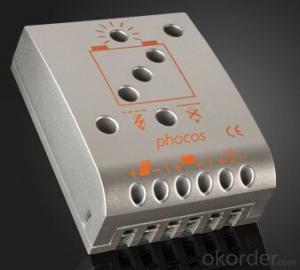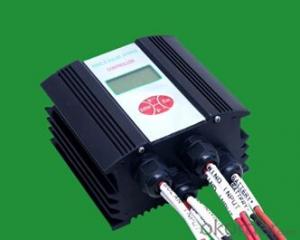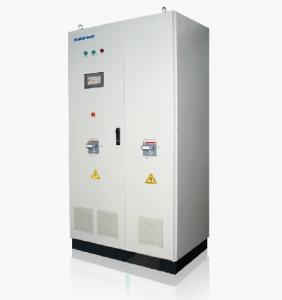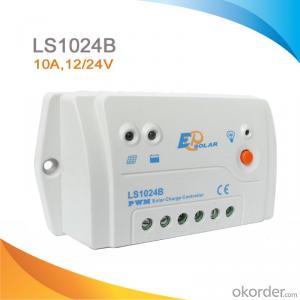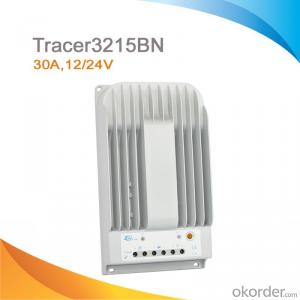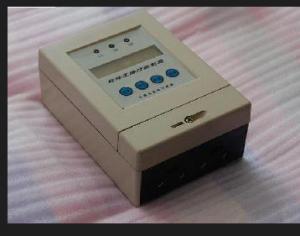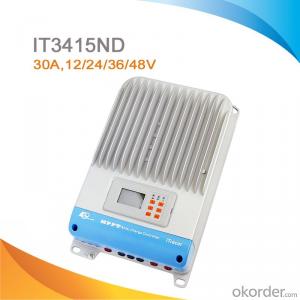Morningstar Solar Controllers - Lawn Light Solar Charge Controller Model CMB03
- Loading Port:
- Shanghai
- Payment Terms:
- TT OR LC
- Min Order Qty:
- 5 unit
- Supply Capability:
- 150 unit/month
OKorder Service Pledge
OKorder Financial Service
You Might Also Like
1. Structure of Lawn Light Solar Charge Controller Model CMB03
This solar charge controller designed for solar lawn lights, solar garden lights, mini solar street light, mini solar advertising light box and so on. The box of the controller is compact sealed with silicon. They have the function of temperature compensation during charging and Sensor Control (optional), fit for 24W /12V or 36W /12V solar panels.
2. Main Features of Lawn Light Solar Charge Controller Model CMB03
· ·Overcharging and Over discharging protection
· · Prevent the reverse current from the battery to the solar panel at night time.
· ·Automatically open the loads after sunset according to the light intensity. (Optional)
· ·Automatically close the loads:
A: battery voltage is in full condition, automatically close the loads after sunrise.
B: the voltage of battery is low; automatically close the loads in advance.
3. Lawn Light Solar Charge Controller Model CMB03 Images
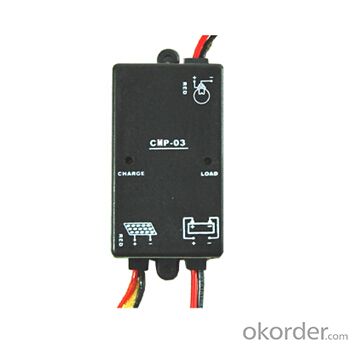
4. Lawn Light Solar Charge Controller Model CMB03 Specification
Rated Voltage | 12V |
Rated Charge Current | 3A |
Rated Discharge Current | 3A |
HVD (High Voltage Disconnection) | 14.4V |
Temperature Compensation | -3mV/℃/cell |
Size | 55×36×20mm |
LVD (Low Voltage Disconnection) | 10.5V |
LVR (Low Voltage Reconnection) | 12.0V |
Light Controller Mode | visibility 20m |
Temperature | -10- +40℃ |
Relative Humidity | ≦90% |
Net weight | 33g |
5. FAQ
We have organized several common questions for our clients, which may help you sincerely:
a) How about your company?
We are able to supply 300,000 inverters and 60,000 solar energy charge controllers per year, the products are sold toward domestic and Europe, Australia Africa and other regions in great quantities.
b) How to guarantee the quality of the products?
The company is approved by the ISO9000 quality management system with its strict product quality control. The products for exportation pass the inspection of relevant foreign nations (CE, ROHS), and get high evaluation of the customers.
c) How long can we receive the product after signing Sales Confirmation?
Generally speaking, if there is enough quantity of finished products which can meet the clients’ requirement, we can manage the delivery within three to five working days according to the instruction of the payment terms in the Sales Confirmation; if the products need some time to get ready, we will arrange thedelivery as soon as possible after the manufacture.
- Q: What is the maximum temperature range that a solar controller can operate in?
- Typically, the specific model and manufacturer determine the maximum temperature range in which a solar controller can function. However, most solar controllers can handle temperature ranges between -40°C to 60°C (-40°F to 140°F) without any notable performance problems. Certain top-notch controllers may even have a broader temperature range, enabling them to operate in exceedingly harsh climates. To guarantee optimal performance and durability in different temperature conditions, it is crucial to consult the manufacturer's specifications and guidelines for the particular solar controller being utilized.
- Q: Can a solar controller be used in a solar-powered electric car racing system?
- Yes, a solar controller can be used in a solar-powered electric car racing system. A solar controller helps regulate and optimize the charging of batteries from solar panels, ensuring efficient energy conversion and storage. In a solar-powered electric car racing system, the solar controller would play a crucial role in managing the power flow from the solar panels to the car's batteries, thus enhancing performance and maximizing the use of renewable energy.
- Q: Can a solar controller be used with a solar-powered irrigation pump?
- Yes, a solar controller can be used with a solar-powered irrigation pump. The solar controller helps regulate and optimize the power output from the solar panels to ensure efficient operation of the pump. It controls the charging and discharging of the batteries and protects the system from overcharging or discharging. Additionally, it can monitor and display important information such as battery voltage, solar panel voltage, and system performance.
- Q: How does a solar controller handle load control and diversion charging?
- A solar controller manages load control and diversion charging by monitoring the energy output of the solar panels and regulating the flow of electricity accordingly. It diverts excess energy to charge auxiliary batteries or divert it to other loads. Additionally, it controls the charging process to prevent overcharging or damage to the batteries.
- Q: Can a solar controller be used with a solar-powered religious institution?
- Yes, a solar controller can be used with a solar-powered religious institution. A solar controller helps regulate and manage the flow of electricity from solar panels to the battery storage system, ensuring optimal charging and preventing overcharging. This is essential for maintaining a reliable and efficient power supply in any solar-powered facility, including religious institutions.
- Q: Can a solar controller be used with solar panels of different outputs?
- Solar panels with varying outputs can indeed be used with a solar controller. The primary function of a solar controller is to regulate the flow of electricity from the panels to the battery or load, guaranteeing proper battery charging and preventing overcharging or battery damage. Solar controllers are specifically designed to be compatible with a range of solar panel outputs. They are typically equipped with maximum input voltage and current ratings, which determine the panels' maximum capacity that the controller can handle. As long as the solar panels' outputs remain within the controller's maximum ratings, they can be utilized together. However, it is crucial to acknowledge that integrating solar panels with significantly different outputs may impact the overall system performance. For instance, if a high-output panel and a low-output panel are connected to the same solar controller, the controller may struggle to optimize the charging process effectively. Consequently, this could result in slower charging or underutilization of the higher-output panel. To ensure optimal performance, it is advisable to use solar panels with similar outputs when connecting them to a solar controller. In situations where using panels with different outputs is necessary, it is worth considering the use of multiple solar controllers or a more advanced charge controller capable of handling various panel outputs.
- Q: Can a solar controller be used with a solar-powered greenhouse?
- Yes, a solar controller can be used with a solar-powered greenhouse. A solar controller is responsible for managing and regulating the flow of electricity from the solar panels to the greenhouse, ensuring optimal performance and efficiency. It helps monitor and control various parameters such as temperature, humidity, and lighting levels, allowing for precise automation and control of the greenhouse environment.
- Q: How does a solar controller prevent damage to the solar panels during hail or storm events?
- A solar controller prevents damage to solar panels during hail or storm events by disconnecting the panels from the electrical system. When it detects an extreme weather event, such as hail or a storm, the solar controller automatically shuts off the power flow from the panels, ensuring that no electrical currents pass through them. This prevents any potential damage that could be caused by the high winds, hailstones, or other hazardous conditions associated with such events.
- Q: How does a solar controller handle the charging of multiple battery banks?
- A solar controller handles the charging of multiple battery banks by using separate charge controllers for each bank or by using a single charge controller with multiple charging outputs. The controller monitors the voltage and state of charge of each battery bank individually and adjusts the charging parameters accordingly to ensure optimal charging for each bank. This allows efficient and balanced charging of multiple battery banks simultaneously from a single solar array.
- Q: Can a solar controller be used with solar-powered irrigation systems?
- Yes, a solar controller can be used with solar-powered irrigation systems. A solar controller helps regulate the power output from solar panels and ensures optimal charging of batteries, which are typically used to store energy for irrigation systems. By using a solar controller, the system can efficiently utilize solar energy to operate the irrigation system.
Send your message to us
Morningstar Solar Controllers - Lawn Light Solar Charge Controller Model CMB03
- Loading Port:
- Shanghai
- Payment Terms:
- TT OR LC
- Min Order Qty:
- 5 unit
- Supply Capability:
- 150 unit/month
OKorder Service Pledge
OKorder Financial Service
Similar products
Hot products
Hot Searches
Related keywords
